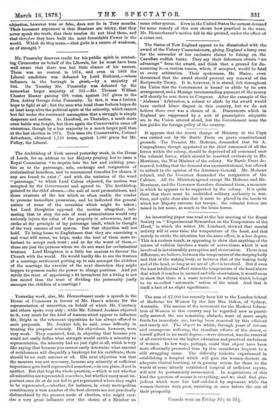Yesterday week, also, Mr. Blennerhasset made a speech in the
House of Commons in favour of Mr. Hare's scheme for the representation of minorities, on behalf of which Mr. Courtney and others spoke very ably ; while Mr. Edward Jenkins objected to. it, very much for the kind of reasons which appear to influence Mr. Bright in the vehement opposition he has always offered to such proposals. Mr. Jenkins felt, he said, some difficulty in treating the proposal seriously. His objections, however, were very weak. They consisted, first, in objecting that because you -could not easily define what strength would entitle a minority to representation, the minority had no just right at all, which is very like saying that because you cannot easily determine what amount of recklessness will disqualify a bankrupt for his certificate, there should be no such amount at all. His next objection was that the measure was not necessary, because any minority of sufficient importance gets itself represented somehow,—in one place, if not in another. But that begs the whole question,—which is not whether all minorities are represented somewhere, but whether many most im- portant ones do or do not fail to get represented where they ought to be represented,—whether, for instance, in every metropolitan constituency a vast number of the best electors are not practically disfranchised by the present mode of election, who might exer- cise a very great influence over the choice of a Member on
some other system. Even in the United States the earnest demand for some remedy of this sort shows how practical is the want. Mr. Blennerhasset's motion fell to the ground, under the effect of a count-out.


































 Previous page
Previous page